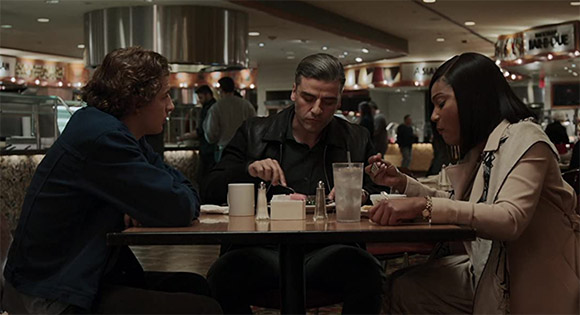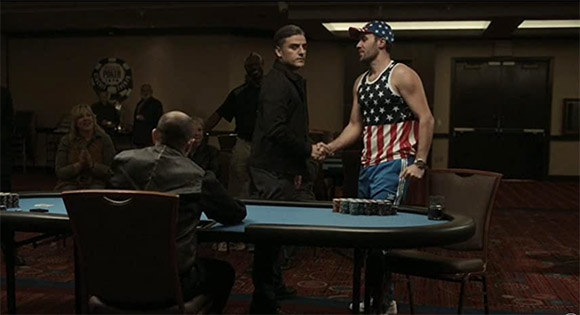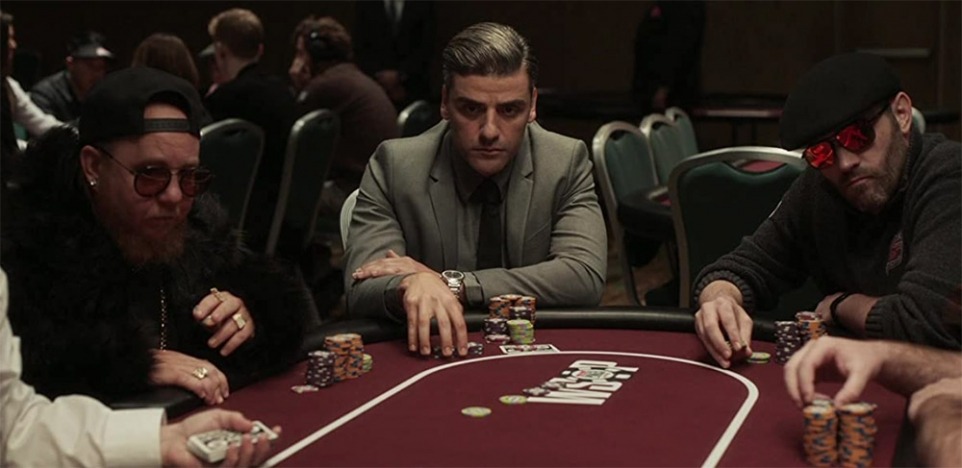"There is a capacity of virtue in us and there is a capacity of vice to make your blood creep."
-- Ralph Waldo Emerson
The root of the word "character" is the Greek kharakter, an engraving tool. It refers to the marks left upon us by life. We are influenced by social, economic, cultural, and familial influences. That is why when we refer to someone's character, we are usually talking about that person's moral strength or attributes, traits, and abilities.
Paul Schrader is a prolific and always creative and ethical screenplay writer and director. He has fashioned an impressive band of intense character studies in his long career starting with Travis Bickle in the script for Martin Scorsese's Taxi Driver through his own First Reformed starring Ethan Hawke as a tormented minister. Other thought-provoking dramas circle around spiritual themes that have always intrigued Schrader -- guilt, forgiveness, doubt, redemption, sin, and atonement.
In The Card Counter, William Tell (Oscar Isaac) is a small-stakes gambler who learned the art of counting cards while serving time in a military prison for having tortured prisoners at Abu Ghraib in Iraq. He is a soft-spoken loner who, like the monks of many religious traditions, finds a certain calm in the solitude and repetitive behavior which for him were two benefits of confinement.
William is still troubled by horrific memories of Abu Ghraib where he came face-to-face with his love of violence. Perhaps in an attempt to keep it under control, he has chosen to simplify his surroundings, making his hotel rooms into cells by wrapping the wall decorations, chairs, tables, and lamps in white sheets. Late at night, William journals about his experiences.

He makes a modest living playing poker and blackjack and competing in card tournaments. Although William is good enough to be a celebrity player, he has chosen to win just enough to get by without drawing attention to himself. La Linda (Tiffany Haddish) wants to sign him up to her stable of poker players and eventually he decides to work with her.
The turning point in William's odd life comes when he takes under his wings Cirk (Tye Sheridan), the son of another torturer guard who, after serving time in prison, turned violent at home and then shot himself. The young man is hell bent on revenge against the man who trained both his his father and William, Major John Bordon (Willem Dafoe). He wants help in this quest, but William tries to turn him in a different direction.
These two wounded men hit the road together, with William serving as a mentor. Schrader has more in mind here than a film about gambling. He's clearly interested in interrogating America's war machine. No wonder William's strongest (and most irritating) competition on the poker circuit is a player who arrives with an entourage chanting "U.S.A.! U.S.A.!"
As he has does in most of his films, Schrader takes us on a wild journey, which even includes a dazzling and romantic sequence at the illuminated Missouri Botanical Garden. His characters, we realize, reveal many sides of human nature.

Go Deeper
In a New York Times interview, Schrader said:
"Contradiction is the heart and essence of character . . . and so you're always looking for people who act and think in contradiction. And so you're always driven to the darker side because people try to portray themselves as one thing when in fact they're something else, and vice versa. So I don't see it as dark characters. I just see them as typically complex and contradictory as we all are."
"We must not despise the rough, the dark, the empty, the cowardly, the flawed or the crooked. It is a package deal."
-- John Mabry
